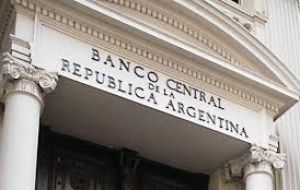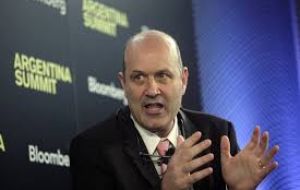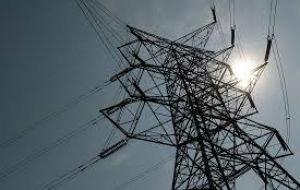MercoPress. South Atlantic News Agency
Argentina increases basic rate 300 points to 30.25% to combat inflation
 “The decision was made with the aim of guaranteeing the disinflation process and the central bank is ready to act again if necessary,” the bank's statement said.
“The decision was made with the aim of guaranteeing the disinflation process and the central bank is ready to act again if necessary,” the bank's statement said.  Federico Sturzenegger said the bank “will continue using all tools at its disposal and conduct its monetary policy to reach its inflation target of 15 per cent for 2018”.
Federico Sturzenegger said the bank “will continue using all tools at its disposal and conduct its monetary policy to reach its inflation target of 15 per cent for 2018”.  Higher utility bills caused by a cut in state subsidies has meanwhile contributed to inflation reaching 25.4% in the 12 months through March
Higher utility bills caused by a cut in state subsidies has meanwhile contributed to inflation reaching 25.4% in the 12 months through March Argentina's central bank surprised markets at the end of the week by jolting its key interest rate up to 30.25% from 27.25%, citing weakness of the local peso against the US dollar and vowing to act again if high inflation persists.
The peso strengthened 1.31% after the move to 20.65 per US dollar. The local currency had fallen sharply since the bank's most recent, regularly scheduled monetary policy meeting on Tuesday, apparently prompting the rate hike.
“Given the dynamics of the exchange market, the monetary policy committee met outside of its pre-established schedule and decided to increase its monetary policy rate,” the bank said in a statement.
Higher utility bills caused by a cut in state subsidies has meanwhile contributed to inflation reaching 25.4% in the 12 months through March, one of the world's highest rates.
“The decision was made with the aim of guaranteeing the disinflation process and the central bank is ready to act again if necessary,” the bank's statement said. It promised to “continue using all tools at its disposal and conduct its monetary policy to reach its inflation target of 15 per cent for 2018”.
The government has adopted policies aimed at spurring economic growth ahead of President Mauricio Macri's expected 2019 re-election bid. The perception of political pressure on the bank to grease economic activity by keeping the money tap open cast doubt on its willingness to raise interest rates.
“The market had doubts about the possibility that the bank would increase rates,” said Gabriel Zelpo, chief economist at local consultancy Elypsis. “Today's decision shows the bank is really engaged in calming the market and fighting inflation. That was not so clear before.”
Early on Friday, the peso had slumped 1.63% to an all-time low of 20.89 to the greenback, traders said, despite massive central bank dollar sales on Wednesday and Thursday designed to stop the currency from further weakening.
The bank sold US$ 853.3 million in the foreign exchange market on Thursday. The day before, it sold US$ 1.472 billion on the local spot market, its largest intervention in currency markets in at least 15 years.
Friday's rate increase was nonetheless surprising after central bank chief Federico Sturzenegger said earlier this month that the bank would wait to evaluate May inflation before deciding on a possible change in monetary policy.
“Inflation has to fall a lot beginning in May” in order for Argentina to meet the 2018 target of 15%, Sturzenegger said on April 16. “If that scenario does not play out, we have to do what we have to do, which in this case is raise the interest rate”




Top Comments
Disclaimer & comment rules-

-

Read all commentsTurning the tide of the disaster left by the previous government was never going to happen overnight and the subsidies on utilities and other services were unsustainable.
May 03rd, 2018 - 02:42 pm +1You may not like it Enrique, but this is a long term plan and not a get rich quick plan for Macri's mates.
Argentina’s governing ship Cambiemos is taking water from all sides, as electors realize they were sold nothing but smoke and mirrors during the 2015 election campaign.
Apr 30th, 2018 - 03:56 am -3No matter. Captain Mauricio Macri continues without flinching a brutal adjustment program that is transferring wealth from the majority into the hands of a few chosen ones.
While the government was quick to lift or reduce taxes on exports of agricultural and mining products, it next applied the brakes on wages, slowed down retirees’ income increases, and allowed steep increases of energy and transportation costs to consumers and businesses.
Meanwhile, a deep fiscal deficit has only grown, financed with unprecedented amounts of foreign borrowing. Opening imports and declining consumption hurts small and medium-size business and regional economies.
Of course, some Argentines remember similar processes—during the military dictatorship of the 1970s, during the Menem government of the 1990s, and finally at the end of the Fernando de la Rua cycle in 2001. All ended in disaster, causing enduring pain to the population but allowing some entrepreneurs to make fortunes through financial speculation and dirty business operations.
The self-named Joyful Revolution is quickly becoming a valley of endless sorrow.
Commenting for this story is now closed.
If you have a Facebook account, become a fan and comment on our Facebook Page!